|
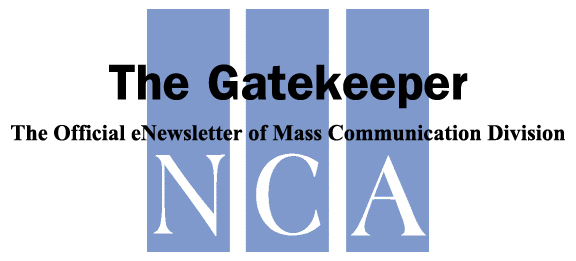
<<click here for archives >>
Vol. 17, No. 1
February/March 2012
Published three times annually by the Mass Communication Division of NCA.
Publications/Web Editor - Nicholas David Bowman, West Virginia University
--- Join NCA's Twitter Feed at http://twitter.com/NatComm ---
-- MCD on Facebook! Click on the Facebook image below to join our group --

361 MCD Facebook Friends and growing strong...join today!
|
Thanks to Great River Technologies for their continued sponsorship of the Mass Communication Division website.
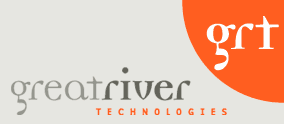
Visit their website at
www.greatrivertech.net
|
|
In this issue:
Welcome from the Chair
Youngstown, OH -- Our division is a vibrant group of mass communication scholars, teachers and practitioners from around the world. Each year in November, we gather to share new research, exchange ideas, and commune with friends and peers. But why should we limit our opportunities to meet as a group to one time a year?
Thanks to the hard work of people like Nick Bowman, our fearless publications and web editor, we have several options for interacting online. Right now, you can visit the Mass Comm Division Facebook page (http://www.facebook.com/groups/NCAMCD/) and post messages about your research ideas, ask questions about teaching mass media, or share requests for research participants. As I type this, there are 340 people in our Facebook group.
Like to tweet? On Twitter, add the hashtag #ncamcd to your tweets when posting messages relevant to MCD members. Use the #ncamcd hashtag to search for indexed tweets. Tweets using the #ncamcd tag are displayed on the http://www.ncamass.com home page.
So, if you're on Facebook or Twitter, check out the MCD members who are already there and consider joining the conversation!
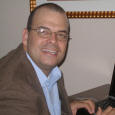 Adam C. Earnheardt Adam C. Earnheardt
Chair, Mass Communication Division
Youngstown State University
acearnheardt@ysu.edu
Facebook - www.facebook.com/adamearn
Twitter - twitter.com/adamearn (@adamearn)
<<back to
top>>
NCA 2012 - MCD Call for Reviewers
Pittsburgh -- A surge in competitive paper submissions has created the need for additional media scholars and graduate students affiliated with NCA to review competitive paper submissions for the Mass Communication Division. If this is you, and you have not already signed up to volunteer and review papers, I urge you to become a competitive paper reviewer for the 2012 National Communication Association annual meeting. If you are interested in becoming a reviewer, please email Brent Malin of the University of Pittsburgh at bmalin@pitt.edu.
The review process is a central part of the annual conference. Reviewers serve the division, organization, and the discipline and provide valuable feedback to beginning as well as advanced scholars in the field. he larger the pool of reviewers, the more equitably we can distribute the work of paper and panel reviewing, keeping the number of reviews at a reasonable number for every reviewer. Finally, serving as a reviewer offers the opportunity to read some of the newest and most interesting scholarship in mass communication.
In your email, please specify your preferences for (1) methods you would like to review (qualitative, quantitative, critical cultural studies, or some combination thereof) and (2) topics you would like to review (Advertising/Consumer Culture; Children/Adolescents/Youth; Feminism/Women's Studies; Film/Cinema; Health; History; International/Intercultural; Journalism/News; Masculinity Studies; Media Effects; Music/Music Video; New Technology [e.g., Blogs, Internet, Social Networking]; Political Communication; Pop Culture; Race; Rhetoric; Sexuality; Sports; Stereotyping; Telecommunications Law/Policy/Business; Television Content; and other topics not mentioned).
In your email, please also include whether you would be willing to serve as a panel chair or respondent at the conference. If you agree to serve as a panel chair or respondent, it is your responsibility to check the 2012 NCA schedule to see if you are listed as a panel chair or respondent. If you are assigned to chair or respond to a panel, you will need to make arrangements to attend the 2012 Convention.
Thank you for your participation and service.
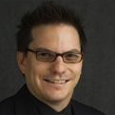 Brett Malin Brett Malin
Vice-Chair Elect, Research Committee
University of Pittsburgh
bmalin@pitt.edu
<<back to
top>>
NCA 2012 - MCD Call for Papers
College Station, TX -- NCA CONVENTION 2012 CALL FOR COMPETITIVE PAPERS AND PANEL SUBMISSIONS:
The Mass Communication Division provides a forum in which scholars and teachers with diverse interests and approaches can come together to contribute to the study of mass and mediated communication. We invite submissions focusing on various questions about why people consume media, the nature of media content in the form of images and codes, and the influence of media on individuals and societies across a wide range of contexts ranging from traditional to new media, health to politics, sports to science, and environment to ethics. All methodologies are respected and welcome.
We invite the following types of submissions: competitive papers, paper sessions, and panel discussions.
SUBMISSION DEADLINE: Wednesday, March 28, 2012 at 11:59 pm Pacific Time.
All submissions should be made via the NCA Submission Central. Emailed or mailed submissions will not be accepted.
It is NCA policy that each submission should be made to only one NCA unit/affiliate organization. The same submission cannot be submitted to more than one NCA unit/affiliate organization.
I. SUBMITTING COMPETITIVE PAPERS
Competitive Paper Program Planner:
Dr. Srividya Ramasubramanian
Department of Communication
202 D Bolton Hall, MS 4234
Texas A&M University
College Station, TX 77843
Email: srivi@tamu.edu
Please follow the online directions in NCA Submission Central for uploading your paper. When you log onto the system, you need to have your paper completed and ready to upload into the system. You need to remember the following:
1. Paper format: Paper length is limited to 25 pages, excluding tables and references. Papers should be double-spaced and use 12 point font. Longer papers will not be considered.
2. No identifying information: Do not include any identifying information anywhere on your paper (including the file name of the uploaded document).
3. First page of text: Your paper should not have a title page. However, please include the title of the paper on the first page of text. You will provide the title of your paper and your name, affiliation, etc. during the submission process.
4. Description (Abstract): The description/abstract (75 words) will be entered separately from the paper. You should not include an abstract in the paper file that you upload to the system. To aid in the review process, please also provide 5 keywords that describe the topic and methodology of your paper.
5. Student papers: Please specify “student papers,” but make this designation for those works authored only by students. No faculty member should be a co-author on a paper designated as a “student paper.” Also, you will need to check a box to indicate whether your submission is a “student paper”.
6. A/V requests: A/V requests must be made at the time of submission; we regret that late requests cannot be accommodated.
7. Scholar-to-Scholar (Poster) sessions: Scholar-to-scholar sessions have been redesigned to encourage alternative forms of presentation, one-on-one interaction, and neighborhoods of knowledge. Scholar-to-Scholar sessions invite submissions using interactive media formats such as posters, laptop displays, and other experiential activities. If you are willing to have your competitive paper submission considered for presentation in the Scholar-to-Scholar session, you must designate this willingness at the time of paper submission by checking the appropriate agreement box. Your competitive paper submission will still be reviewed by the Mass Communication Division, but may be scheduled to be presented in the Scholar-to-Scholar session. Just because you designate your willingness to have your competitive paper submission considered for the Scholar-to-Scholar session, however, does not guarantee that it will be scheduled for this session. Your competitive paper submission, if accepted, may still be scheduled for presentation in the traditional paper format.
All questions relating to competitive papers (not panel sessions) should be directed to Dr. Srividya Ramasubramanian, Texas A&M University, srivi@tamu.edu.
II. SUBMITTING PAPER SESSIONS AND PANEL DISCUSSIONS
Thematic Panel Program Planner:
Dr. Dana Mastro
University of Arizona
Department of Communication, Bldg 25
Tucson, AZ 85721
Email: mastro@email.arizona.edu
Please follow the online directions for submitting your panels. Submitters of both paper sessions and panel discussions will be expected to submit a general description (75 word limit) and extended rationale (400 word limit). For paper sessions, individual paper titles and descriptions/abstracts also need to be included with the submission (75 word limit for each individual description/abstract).
Panels on the conference theme, “Celebrate COMMunity,” are especially encouraged.
Questions regarding panel submissions (not competitive paper submissions) should be directed to Dana Mastro, University of Arizona, mastro@email.arizona.edu.
Please Note: Prior to submission, all submitters are encouraged to review the Professional Standards for Convention Participants (http://natcom.org/uploadedFiles/PDF-CRL-NCA_Convention_Standards.pdf). Helpful resources, including live and recorded step-by-step instructions on how to submit, are available in the Convention Resource Library (http://natcom.org/conventionresources/).
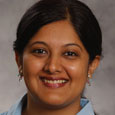 Srividya Ramasubramanian Srividya Ramasubramanian
Research Committee Chair
Texas A&M University
srivi@tamu.edu
<<back to
top>>
NCA recognizes College of New Jersey's LPE chapter as "best"
Ewing, NJ -- The National Communication Association (NCA), the largest and most distinguished organization of communication scholars in the United States has confirmed that TCNJ communication studies students have won more national honors in the form of elected officers and “best student paper in the nation” awards than have students from any other college or university in the United States.
"The College of New Jersey’s chapter of Lambda Pi Eta (LPH), the official honor society of the communication discipline, is the most highly represented and awarded chapter on the national level since NCA took over management of the honor society in 1995," said Brad Mello, associate director for educational initiatives at NCA, in a letter issued on Oct. 31, 2011.
According to Mello, the College’s Lambda Pi Eta involvement stands out among all other schools in the nation.
“The (honor society) chapter at The College of New Jersey first, has had more students serve as national presidents and vice-presidents of Lambda Pi Eta than any other chapter,” said Mello. “Additionally, Lambda Pi Eta students from the College of New Jersey have been awarded the most Stephen A. Smith best individual and group paper in the nation honors at our annual conventions.”
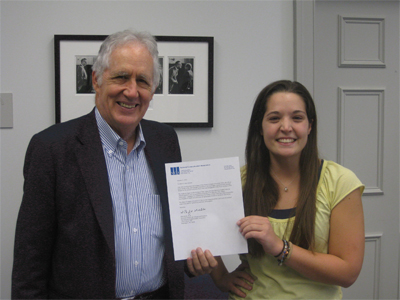 According to John Pollock, adviser to the TCNJ communication studies honor society chapter since 1994, students from the College have won the national presidency of the honor society eight times and the national vice presidency six times. They have also earned five Stephen A. Smith annual awards for best paper in the nation, four of which focus on health or risk communication, a special strength of the communication studies department. According to John Pollock, adviser to the TCNJ communication studies honor society chapter since 1994, students from the College have won the national presidency of the honor society eight times and the national vice presidency six times. They have also earned five Stephen A. Smith annual awards for best paper in the nation, four of which focus on health or risk communication, a special strength of the communication studies department.
“Our communication studies honor society chapter is deeply grateful for the recognition our students have won over so many years, beginning with the first student from TCNJ winning the national presidency in 1996. We wish to thank the faculty for providing such dedicated mentoring to motivate us to submit winning papers, and we are determined to use the honor to rise to even higher levels of achievement,” said senior Katie Ward, the 2011-2012 president of the TCNJ national honor society chapter.
Other members of the TCNJ honor society board include: junior Natalie Steele, vice president of programming; senior Audrey Hix, vice president of publicity; senior Victoria Vales, vice president of scholarship and membership; senior Alexis Hankh, treasurer; and junior Carly Koziol, “The Roar” newsletter editor. Another student leader is senior Domenick Wissel, vice president of the department-sponsored interdisciplinary Public Health Communication Club.
“As co-author of over 100 refereed papers with students that they themselves presented at state, regional, national and international conferences, and as advisor to the interdisciplinary health communication concentration, I am pleased that our communication studies students’ commitment, intelligence, and motivation have been recognized by the oldest and largest organization of communication scholars in the United States,” said Pollock. “This affirmation of excellent performance by the NCA confirms the reputation of the communication studies department as ‘A National Leader in Student-Faculty Engagement.’”
In 2003, the TCNJ honor society chapter won the NCA award for “National Chapter of the Year,” and Pollock won the NCA Thomas L. Veenendall award for national “Advisor of the Year.”
“The (TCNJ honor society chapter) is to be congratulated for its service to the national organization and its outstanding scholarly achievements,” said Mello, concluding his letter from NCA.
The National Communication Association (NCA), the oldest and largest organization of communication scholars in the United States, has 7600 members. Lambda Pi Eta, the official national student honor society of NCA, has nearly 8000 members and 500 chapters in as many colleges and universities nationwide.
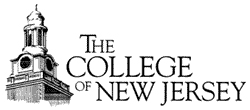
<<back to
top>>
Entman awarded Alexander von Humboldt Research Award
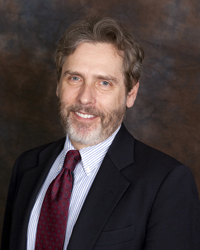 Alexandria, VA -- Robert Entman, J.B. and M.C. Shapiro Professor of Media & Public Affairs and professor of international affairs at George Washington University, has won an Alexander von Humboldt Research Award for his ground-breaking contributions to the field of political communication. He is the world’s first political communication scholar to receive this award. Alexandria, VA -- Robert Entman, J.B. and M.C. Shapiro Professor of Media & Public Affairs and professor of international affairs at George Washington University, has won an Alexander von Humboldt Research Award for his ground-breaking contributions to the field of political communication. He is the world’s first political communication scholar to receive this award.
Entman’s research focuses on media framing and bias and the media’s influence on foreign policy, race relations, and other aspects of American politics. His conceptualization of “framing” has been cited in thousands of scholarly works. In his forthcoming book, Scandal and Silence: Media Responses to Presidential Misconduct (Wiley, 2012), he challenges the conventional wisdom that the media actively seek out and publicize scandals, arguing that media actually neglect most instances of corruption, providing too little, not too much coverage. Occasionally, bad behavior stimulates an avalanche of media attention with demonstrable political consequences, but often equally shoddy conduct receives little notice. Entman advances a theoretical model to explain these differences, revealing an underlying logic to what might otherwise seem to be arbitrary and capricious journalism.
Entman’s previous book, Projections of Power: Framing News, Public Opinion and U.S. Foreign Policy, won the 2011 Doris Graber Book Award from the political communication section of the American Political Science Association (APSA). In November, he received the 2011 Wayne A. Danielson Award for Distinguished Contributions to Communication Scholarship, given annually by the Jesse H. Jones College of Communication at the University of Texas. His other honors include the Woolbert Research Prize and Distinguished Scholar award from the National Communication Association and the Murray Edelman Distinguished Career Achievement Award in Political Communication from the APSA.

<<back to
top>>
Eastern Communication Association Logo Contest
Pittsburgh -- THE EASTERN COMMUNICATION ASSOCIATION (ECA) is asking students to help create their new logo. The top designs will be on display at the 2012 ECA Convention in Cambridge, Massachusetts. ECA members will have an opportunity to vote for the logo design they believe to be the best representation for the association. The selected logo will then become our official logo and be included in all publications, on the website, and in promotional materials. Please encourage graduate and undergraduate students to submit a design.
Designs that meet the following criteria will be considered for the final round:
- The Eastern Communication Association name and the letters ECA are identified somewhere in the design
- No more than two colors are used (in addition to black)
- The design also works well printed in black only
- The logo can be reduced and enlarged without compromising the basic design.
The top designs selected will be placed on the ECA website for members to review prior to the 2012 convention. Voting will then take place in Cambridge where each logo will be on display. The winner of this contest will receive $200 and registration to the 2013 convention. If the winning logo is designed by a group, each individual listed on the submission (up to seven) will receive the 2013 convention registration. The design must be submitted as a .jpeg file that can be easily opened and inserted into Word documents.
Submissions should be sent electronically, along with a completed registration form which is attached (the form is also posted on http://www.ecasite.org/). First round judging will be completed by the Visual Image Task Force Logo committee consisting of Nick Bowman (West Virginia University), Cindy Lont (George Mason University), and Matthew J. Smith (Wittenberg University). The deadline for submission is March 15th, 2012.

<<back to
top>>
King's College Student Radio receives national award nominations
Wilkes-Barre, PA -- Twelve student staff members of the King’s College radio station, WRKC-FM, are finalists for Intercollegiate Broadcasting Service (IBS) Awards. King’s placed finalists in 10 of the 38 categories in which awards will be presented at a ceremony to be held March 3 in New York City. WRKC’s 10 nominations were the most from among IBS member stations in Pennsylvania. This is the first time WRKC submitted nominees for the annual awards.
In addition to individual nominations in categories for news feature, spot news, community news, news interview, public service announcement, sports play-by-play, documentary, and radio drama, WRKC is among four nominees for best radio station for colleges or universities with an enrollment less than 10,000 students. WRKC will be competing for the award with stations from Case Western University, the University of Tennessee – Martin, and Goshen College. If victorious in its category, WRKC will then compete with the winners for best stations from community colleges and from larger colleges and universities for the Abraham & Borst Award for Best Overall Radio Station in the Nation.
“This is a significant accomplishment for our students,” stated Sue Henry, WRKC’s general manager. “Our station is a college club, which gives students from all majors a chance to be part of our programming. Some of the students competing for the awards are mass communications majors, and others are from the theater, education and technical writing programs. We are lucky to have great support from a number of departments, including mass communications.”
“WRKC's 10 nominations from the Intercollegiate Broadcasting System is an exceptional accomplishment that demonstrates the creative and intellectual skill set of our students, the exceptional training and guidance provided by Sue Henry, and the outstanding education provided in the classroom environment,” commented Dr. Michelle Lawrence-Schmude, chairperson of the King’s College mass communications department.
Founded in 1940, the Intercollegiate Broadcasting Systems is an association and foundation which represents more than 1,000 non-profit, educationally affiliated radio stations.

<<back to
top>>
Michigan State Doctoral candidate wins University-wide teaching award
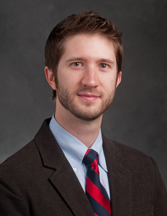 East Lansing, MI -- Matthew Grizzard, a graduate student at Michigan State University, has been awarded the school's Excellence-in-Teaching Citation. This citation is awarded to graduate teaching assistants who have distinguished themselves by the care they have given and the skill they have shown in meeting their classroom responsibilities. East Lansing, MI -- Matthew Grizzard, a graduate student at Michigan State University, has been awarded the school's Excellence-in-Teaching Citation. This citation is awarded to graduate teaching assistants who have distinguished themselves by the care they have given and the skill they have shown in meeting their classroom responsibilities.
The text from his citation (also available here):
"Matthew N. Grizzard is a teacher who is dedicated to not only expanding his student’s knowledge but also to providing his students with valuable skills that they can apply throughout their college career and beyond. His courses on media effects and media entertainment provide students with understandings of psychological processes that apply far beyond the mass media. As one student put it: “Matt is one of the best instructors I’ve had in my 4 years at MSU. One of the most beneficial COM classes I’ve had so far.”
Mr. Grizzard’s passion for the course material and his enthusiasm for teaching leads students to connect deeply with the material and to embrace the classroom environment. After taking his Audience Responses to Media Entertainment class, one student commented: “By far one of the best professors I’ve had here at MSU. Made the class very enjoyable. I actually never wanted to skip!” Mr. Grizzard has even had students campaign for the university to hire him in teaching evaluations: “Matt is a great teacher. He should be hired on as a professor. I learned more in this class (and enjoyed it more) than most classes I have taken at MSU.”
In addition to teaching, Matt is also an active and accomplished researcher. As a graduate student, he already has multiple articles published in the Journal of Communication, the flagship journal of the International Communication Association. His work has also been presented at annual conferences for multiple scholarly associations including the International Communication Association, the National Communication Association, the Broadcast Education Association, and the Association for Education in Journalism and Mass Communication.
Through his dedication to teaching and research, Mr. Grizzard has distinguished himself as truly deserving the Excellence-in-Teaching Award."

<<back to
top>>
Woodbury University Dean named to Burbank Cultural Arts Commission
Burbank, CA -- Dr. Edward Clift, Dean of Woodbury University's School of Media, Culture & Design has been appointed to the City of Burbank Cultural Arts Commission.
"The city and the commission have wanted Woodbury's involvement in helping bring together improve, and promote the arts in Burbank," says Dr. David Rosen, vice president, Academic Affairs, Woodbury University.
"Eddie's willingness to get involved and represent the university in this important work is crucial to the development of the city and the Valley and vital for the university and all its stakeholders. In being good citizens in this way, we not only do good, but we create the conditions for our own success."
Founded in 1884, Woodbury University is one of the oldest institutions of higher education in Southern California. Woodbury University School of Architecture is a network of hubs strategically sited within the Southern California megalopolis: Los Angeles, Burbank, Hollywood, and San Diego. Together, these sites form a critical infrastructure for architectural investigations. The school's undergraduate and graduate programs in architecture and interior architecture train students as entrepreneurs, architect citizens, and cultural builders.

<<back to
top>>
Pepperdine University offers new MA in Media Production
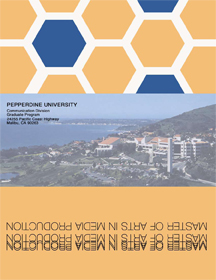 Malibu, CA -- Pepperdine University's Communicatin Division has announced a new MA in Media Production currently enrolling students for the Summer and Fall 2012 semesters. From their brochure: Malibu, CA -- Pepperdine University's Communicatin Division has announced a new MA in Media Production currently enrolling students for the Summer and Fall 2012 semesters. From their brochure:
"Our new M.A. in Media Production is for students fascinated by storytelling across multiple platforms,
from cinema to television to the web. Inspired by some of the entertainment industry's best professionals,
students delve into storytelling techniques across the ages, and learn cutting edge techniques for inspiring and
transforming audiences for films, TV programs, Public Relations and Advertising campaigns, music videos, live concerts and much more."
To enroll in the program, students must have a Bachelor's degree with a minimum GPA of 3.00, and coursework in communication-related areas such as advertising, public relations, media production, film, journalism, or new media. Students without these specializations may be asked to take up to 20 hours of undergraduate-level courses to deveop a competency prior to starting the MA program. As well, professional field experience may be substituted for some of these requirements.
Pepperdine University is a Christian university committed to the highest standards of academic excellence and Christian values, where students are strengthened for lives of purpose, service, and leadership. Founded in 1937, the University currently enrolls nearly 3500 students in the Seaver College undergraduate liberal arts college.
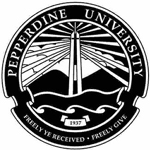
<<back to
top>>
CONFERENCES AND CALLS
CALL FOR PARTICIPANTS
Media, Education and Human Values in Children and Youth (MEDUCON)
Austin, Texas
Deadline: May 15, 2012
Please register before May 15th to get early bird discounts for educators and media scholars for the MEDUCON Austin to be held from June 8th to 10th at the University of Texas Alumni Center, 2110 San Jacinto Boulevard, Austin, TX 78712.
Conference objectives:
- Learn and understand ways of enhancing the positive influence of media & communication technology to develop positive thoughts and actions; enabling character education
- Promote effective use of media & communication technology in imparting education
- Encourage the integration of human values in media and education
- Empower participants to create stress free and violence free environments that enhance and nurture learning and promote holistic development of children and youth. Learn and understand the importance of emotional and social intelligence in developing successful leadership traits.
Conference highlights:
- Panel discussions to facilitate best practices of how to harness the power of media to enhance teaching and accelerate learning
- Brainstorming solutions on how knowledge, skills and values can be imparted to the next generation using the power and influence of media
- Thought provoking speakers to inspire and educate on improving creativity, leadership and decision-making
- Self-awareness techniques to help enhance creativity, improve emotional and social intelligence, nourish positive human values and thereby empower participants to take responsible decisions.
Speakers:
- Dr. Mary Beth Oliver, Distinguished Professor and Co-Director of Media Effects Research Lab, Pennsylvania State University
- David Kleeman, President, American Center for Children and Media, Chicago
- Dr. Michon Benson, Principal, WALIPP Preparatory Academy, Houston
- Dr. Leonard Moore, Professor and Associate Vice-President for Diversity and Community Engagement, University of Texas-Austin
- Dr. Srividya Ramasubramanian, Assistant Professor and Director of Communication Research Lab, Texas A&M University
Contact Srivi Ramasubramanian at srivi@tamu.edu for more details. Visit the conference website for information about registration and conference sessions at: www.globalmeducon.org
More information at: www.globalmeducon.org.
<<back to
top>>
CALL FOR PAPERS
George Gerbner Conference on Communication, Conflict, and Aggression
Budapest, Hungary
Deadline: March 1, 2012
Inspired by the life and work of Budapest native and renowned Communication and Media scholar Dr. George Gerbner (1919-2005), the Budapest College of Communication and Business invites scholars, researchers, practitioners, students, and other interested parties to submit paper and panel proposals for presentation at the George Gerbner Conference on Communication, Conflict, and Aggression. This conference will take place from Friday, June 01 to Saturday, June 02, 2012 in Budapest, Hungary. The goal of the conference is to bring together individuals with a common interest in aggressive communication and conflict so as to foster international relationships that lead to research collaboration and knowledge exchange. The inaugural Gerbner Conference, held in May 2010, featured presentations by scholars from seven countries and three continents.
This international conference will focus on aggressive communication and behavior, conflict, and other types of antisocial communication and behavior across contexts. Specific topics include, but are not limited to: media violence, media coverage of crime and violence, violence in advertising, political violence, workplace violence and aggression, aggression in instructional settings, war rhetoric, peace and conflict communication, verbal aggression, crime, oppression, injustice, incivility, assertiveness, argumentativeness, disagreement, bullying, indirect aggression, psychological abuse, anger, frustration, hostility, deception, child abuse, spousal abuse, domestic violence, youth violence, school violence, gang violence, sexual violence, discrimination, conflict styles, conflict resolution, the origins, causes, and predictors of aggression, and the management and prevention of aggression.
Interested individuals are invited to submit an abstract (in English) of 200 to 500 words describing their individual presentation or panel idea to Rebecca.Chory@mail.wvu.edu by March 01, 2012. Decisions regarding the acceptance of papers and panels for presentation at the conference will be made by March 19, 2012. Completed papers should be sent to Rebecca.Chory@mail.wvu.edu by May 01, 2012. With the author's permission, top papers will be published in the journal Kommunikáció, Média, Gazdaság (Communication, Media, Economics), which is published by the Budapest College of Communication and Business or in an edited book. One scholar will also be honored with the Gerbner Award. The conference registration fee is expected to be approximately $50 to $60 (50 to 60 US dollars).
Co-organizers of the conference are Dr. Jolán Róka, Vice Rector for Research and International Relations at the Budapest College of Communication and Business, and Dr. Rebecca M. Chory, Associate Professor of Communication Studies at West Virginia University and 2009 Fulbright Scholar at the Budapest College of Communication and Business. For more information, please contact Jolán Róka at jroka@bkf.hu; +36-20-366-5023 (tel); Budapest College of Communication and Business; Nagy Lajos király útja 1-9; 1148, Budapest, Hungary; or Rebecca M. Chory at Rebecca.Chory@mail.wvu.edu; 304-293-3905 (tel); P.O. Box 6293, 108 Armstrong Hall; West Virginia University; Morgantown, WV, 26506; USA.
The full call for papers is also available here.
<<back to
top>>
CALL FOR PARTICIPANTS
It's More than Just a Game: Best Practices In Video Game Research Design and Methodology
May 24, 2012
ICA Phoenix
Deadline: Until registration limit is met
Scholarly interest in video games has grown almost as fast as popular interest in the medium itself. Yet, the study of video games - be it experimental or critical - brings with it a nuanced set of challenges, as the medium often finds itself somewhere between video (analogous to television and film) and game (analogous to logic puzzles or sports competition). This issue of definition is not trivial, as it speaks to larger methodological concerns when attempting to understand both how video games are played and how game play affects us at the cognitive, affective, and behavioral levels.
Organized by the Game Studies Interest Group, this pre-conference will bring together scholars interested in studying video games to discuss best practices in designing research aimed at studying video games. Leading game scholars from diverse backgrounds have been invited to lead discussions in their areas of expertise by drawing from personal experiences and theoretical considerations within a variety of contexts and epistemological to studying video games. Notably, our pre-conference will be designed to support ongoing dialogues both during and following each session, providing attendees with a true “workshop” environment with which to refine their own research programs.
The goal of this pre-conference is to provide all attendees with an opportunity to reflect on and plan future video game research with a small group of similarly-interested colleagues. To this end, attendees will be encouraged to submit a video game-related research proposal abstract (no more than 500 words) prior to the pre-conference that they are comfortable sharing with conference attendees. We will share these abstracts with our discussion leaders to help stimulate conversation during the events, and we will also post them to an accessible web page prior to the pre-conference so that other attendees can read through them and seek out potential collaborations at the event.
Attendees are encouraged to bring research ideas, laboratory notes, raw data sets and experimental designs with them to the pre-conference. During our workshop presentations, attendees are actively encouraged to work on their own projects with each other and the presentation discussion leaders; workspaces will be provided to facilitate this format.
Time: Thursday, 24 May 11:00 - 17:00
Cost: $20 USD; $5 USD Students (Registration includes pre-conference attendance, a catered lunch and food and beverage refreshments throughout the day. GSIG members will also unlock the “pre-conference” achievement badge)
Location: Walter Cronkite School of Journalism and Mass Communication, Arizona State U located at 555 N. Central Avenue, Phoenix AZ 85004, less than one block from the Sheraton Phoenix Downtown Hotel (CRONK 314)
Limit: 60 persons
Schedule of Events:
11:00 a.m. - Noon
Informal lunch and “meet & greet”
- Wrap buffet, including:
- beef, turkey and vegetarian options
- pasta salad and Caesar salad
- cheese, bread and crackers board
- chicken chimichangas
- chips and salsa
- Opening comments from Game Studies Interest Group representatives
12:15 p.m. - 1:45 p.m.
Data Acquisition: Best Practices for Understanding Players, Their Motives, and Their Experiences
As video games continue to soar in popularity, increased scrutiny has been placed on understanding gamers by policy-makers and scholars alike. Yet, our understanding of gamers is limited by the quality of data we are able to get regarding their makeup, motives, and experiences while playing. This panel will discuss how we study gamers from a critical, socio-psychological, and psychological perspective. Workshop leaders include:
- Jeoren Jansz (Erasmus U, NETHERLANDS) on the psychology of gamers before and during gameplay
- Leonard Reinecke (U of Mannheim, GERMANY) on the intrinsic motivation of video game play
- John Sherry (Michigan State U, USA) on developmental processes in gaming from childhood through adulthood
- Gerald Voorhees (Oregon State U, USA) on using psychoanalytic and cultural studies as critical tools to analyze gamers
- Dmitri Williams (U of Southern California, USA) on working with game publishers to make sense of server-side player data
2:00 p.m. - 3:30 p.m.
Constructing a Game: Better Research Through Better Stimulus Design
Having evolved from the two-dimensional monochromatic presentations of Pong, today’s video games represent the cutting edge of computing technology and narrative engagement to fully immerse users in vivid and interactive environments. While these aspects of gaming are central to their immense popularity, they present unique challenges to researchers wanting to understand the many nuances of the medium. This panel seeks to walk participants through these nuances by presenting a comprehensive look at video game design, from storyboard to special edition. Workshop leaders include:
- Ashish Amresh (Arizona State U, USA) on the mechanics of video game design
- James Gee (Arizona State U, USA) on viewing video games as learning experiences
- Sven Jockel (U of Erfurt, GERMANY) on using “off the shelf” video game engines to create experimental environments
- Wei Peng (Michigan State U, USA) on best practices of developing or choosing treatment and control stimuli in games research
- Bonnie Nardi (U of California-Irvine, USA) on viewing game design through the player’s own ethnographic lens
3:45 p.m. - 5:00 p.m.
The Spread Gun Isn’t Always The Most Accurate: Pairing Up Methodology With Research Questions - Collaborative Workshops
The first session focused on data acquisition techniques and the second section focused on stimulus materials. Building from the above discussions, the final panel of the day will discuss how to apply certain methods to certain research questions. Directly following this discussion, pre-conference participants will break into smaller groups to collaborate on projects. This session will end with closing comments and research charge by pre-conference organizer Nicholas David Bowman (West Virginia U)
Workshop Leaders Biographies:
- Ashish Amresh (Arizona State U, USA) is an Assistant Professor in the College of Technology and Innovation and is leading the Computer Gaming curriculum initiatives at Arizona State U, where he founded the Computer Gaming Certificate and the Camp Game summer program. Dr. Amresh’s workshop discussion will cover some basics of design, mechanics, controls and flow in video games, as well as potential connections between design methodology and experiential learning. He will then facilitate a discussion with attendees on how these themes may influence game studies from a Communication perspective.
- Jeoren Jansz (Erasmus U, NETHERLANDS) is a special Professor of Communication and Media in the Department of Media and Communication. Dr. Jansz's workshop discussion aims to address motivational issues in videogame research. Different theoretical perspectives (e.g., U&G, SDT) have contributed to the emerging empirical tradition of measuring what motivates people to play. A critical assessment of available concepts and theories will obviously be part of the workshop; however its focus is on discussing the strengths and weaknesses of different research methods (quantitative and qualitative) and measurement instruments. The workshop will be truly interactive: participants are invited to submit their own past research or planned future research to be discussed during the meeting.
- James Gee (Arizona State U, USA) is the Mary Lou Fulton Presidential Professor of Literacy Studies at Arizona State U. Dr. Gee’s workshop discussion will focus on the topic of learning within video games and the task of studying how video games facilitate learning. He will introduce his own extensive work in this area, provide recommendations for approaching the study of games for learning, and then facilitate a discussion with attendees about potential research designs in this area.
- Bonnie Nardi (U of California-Irvine, USA) is a faculty member in the Department of Informatics in the Donald Bren School of Information and Computer Sciences at the U of California, Irvine. Dr. Nardi’s workshop discussion will focus on ethnography as a critical methodology for studying how video games are actually played by human persons conceived holistically as sociocognitive agents. Ethnography entertains questions beyond (or in addition to) narratology or play analyzed statistically as decontextualized variables. Her new book Ethnography and Virtual Worlds: A Handbook of Method (Princeton U Press) provides inspiration for her remarks.
- Wei Peng (Michigan State U, USA) is an Assistant Professor in the Department of Telecommunications, Information Studies, and Media, Michigan State U who is also affiliated with the Games for Entertainment and Learning (GEL) lab and the Health and Risk Communication Center, both at MSU. Dr. Peng’s workshop discussion will examine best practices of developing or choosing treatment and control condition stimuli in video game related experimental studies to ensure internal, external, and ecological validity.
- Leonard Reinecke (U of Mannheim, GERMANY) holds a Ph.D. in Psychology from the U of Hamburg and is a post-doctoral researcher at the Department of Media and Communication Studies at the U of Mannheim, Germany. Dr. Reinecke’s workshop discussion will present an argument for video games as intrinsically motivating experiences. Research has demonstrated the ability of video games to satisfy a set of intrinsic needs crucial for psychological well-being and vitality. Need satisfaction is a robust predictor for selective exposure to games and game enjoyment, which situates need satisfaction as a crucial motivation to engage in game play.
- John Sherry (Michigan State U, USA) is an Associate Professor of Communication at Michigan State U who is affiliated with Games for Entertainment and Learning (GEL) lab and the Media Interface and Network Design (MIND) lab, both at MSU. Dr. Sherry’s workshop discussion will argue that games are more than just content; they are intellectual challenges. Thus, game researchers cannot rely on motivational theories from content-dominate media and must rethink the influence of player motivational orientations. This workshop will focus on the theoretical and methodological implications of game play motivations, including how these motivations vary in childhood and adulthood.
- Gerald Voorhees (Oregon State U, USA) is an Assistant Professor of Media and Cultural Studies jointly appointed in the Department of Speech Communication and the New Media Communication program. Dr. Voorhees’s workshop discussion will present thoughts on using critical studies perspectives to understand video gamers. Critical perspectives on games encourage researchers to interrogate how the experience of gameplay is imbricated in relations of power. This talk discusses cultural studies and psychoanalytic approaches as critical tools for analyzing gameplay as an increasingly important site where culture and identity are constructed, circulated and contested.
- Dmitri Williams (U of Southern California, USA) is an Associate Professor at the USC Annenberg School for Communication & Journalism, where he is a part of the Annenberg Program on Online Communities (APOC). Dr. Williams’ workshop discussion will focus on the benefits/challenges of partnering with game publishers to conduct research, e.g., acquiring access to large-scale datasets on the back end of MMOs. He will describe this process, highlight some of his own extensive work through such partnerships, and facilitate a discussion about how attendees may be able to use this method in their own research.
- Sven Jockel (U of Erfurt, GERMANY) is an Assistant Professor of Communication and Digital Media at the U of Erfurt where he chairs the Master’s program on Children, Adolescents and the Media. Dr. Jockel’s workshop discussion will investigate the strengths and weaknesses of using “off-the-shelf” video games in research design. As a foundation for this discussion, he will share his experience using the Aurora Toolset in creating stimulus material for a series of experiments. Aurora provides an intuitive but powerful toolset that allows experimenters to craft both action- and story-related gaming content for use even with low-powered PCs.
Sponsors:
This year’s program is made possible through the generous support of the following institutions:
- Annenberg School of Communication, U of Southern California
- Department of Communication, Michigan State U College of Communication Arts and Sciences
- Department of Telecommunication, Information Studies, and Media, Michigan State U College of Communication Arts and Sciences
- Department of Communication, West Virginia U Eberly College of Arts and Sciences
We also wish to acknowledge the Walter Cronkite School of Journalism and Mass Communication, Arizona State U, and Dean Christopher Callahan for their generous support in hosting our pre-conference.
Contact Person:
For more information about the preconference, please contact Nicholas David Bowman, West Virginia U, Nicholas.Bowman@mail.wvu.edu.
<<back to
top>>
CALL FOR PAPERS
Urban Communication Foundation White Papers
"Digital Networks and Urban Public Space"
Deadline: April 30, 2012
Urban Communication is the study of communication within an urban context. The built environment is rich with information and physical architectures that manifest unique social situations. From traffic patterns to sidewalks, to mobile computing and surveillance technologies, the issues presented by the rapidly changing communication context constructed through urban environments are vast and varied.
The Urban Communication Foundation (UCF) has been a leader in promoting scholarship in this general area. The Foundation has funded dozens of research projects and acknowledged dozens of scholars that have advanced the field of study. We now seek to extend this influence by focusing in on particular issues or areas of research. As such, will be soliciting public research reports on issues that have a direct bearing on public policy and/or the everyday life for people within cities.
These reports should be between 8000-10000 words in length and present original research on the topic. The end product should aim to have some influence on policy makers, community leaders and scholars and contribute to basic research and practical solutions. The author(s) of the top rated proposal will receive a stipend of $10,000. The money can go to individuals or institutions to provide various forms of research support.
The UCF is proud to announce the first call for research reports on the topic of Digital Networks and Urban Public Space. Interested researchers should submit a proposal outlining the research problem and how it intersects with established urban questions or problems that have yet to be adequately addressed. (See guidelines below).
Topics might include but are not limited to:
- how urban architecture can use digital scaffolding to enhance public spaces
- how Federal or municipal communication policies can positively impact municipal governments or civic life
- the relationship between open data, communication infrastructures, and better government
- communication technology-focused citizen engagement
- how digital networks alter sense of place and change the shape and role of cities
Proposals should address each of the following:
- Identification of the communication problem or opportunity
- Description of the research project and methodology employed
- Desired impact
Each of these three sections of the proposal should be limited to approximately 500 words. Please include a cover page with the name, position, institution, and contact information for all authors. Please adhere to a standard citation form.
- Applications should include a short itemized budget and a concise statement providing a rationale for the expenses listed in the budget. Funds may be expended in a variety of ways (e.g., to hire a research assistant or for a course by-out), provided that it is clear how doing so will enable the researcher(s) to complete the proposed work. Funds may not be used to purchase computer hardware. Funds awarded by the UCF may be utilized to offset fringe costs (such as those often involved in hiring a research assistant), but the Foundation will not cover overhead expenses (i.e., indirect costs). In any case, the total amount of the award will not exceed $10,000.
- Applicants should include a current CV and one letter of recommendation. The referee should be able to assess the significance and viability of the project described in the proposal, as well as the qualifications of the applicant as they pertain to the proposed work.
- Proposals should be submitted to Eric Gordon at Eric_Gordon [at] emerson [dot] edu no later than April 30, 2012. Funding decisions will be made by June 1, 2012. White papers should be completed no later than May 1, 2013. White papers will be published on the UCF website and disseminated widely.
Evaluation of Proposals and Awarding Funds
- A committee consisting of two Urban Communication Foundation members of the Board of Directors and the Board of Advisers, as well as an external reviewer will evaluate all applications submitted by the specified deadline.
- UCF will contact the author(s) of the top-rated proposal to ascertain their commitment to the proposed research project and will subsequently release funds to the researcher(s).
- The UCF will announce the proposal selected on the Foundation's web site. The author(s) will be recognized as Urban Communication Foundation Fellows.
(c) 2012 The Urban Communication Foundation, all rights reserved.
<<back to
top>>
CALL FOR PAPERS
Mass Communication and Society
Symposium: Entertainment Media and Politics
Deadline: September 30, 2013
A wide range of studies encompassing a variety of epistemological frameworks have been published on the topic of entertainment media and politics. There exists a critical mass of scholars who are devoting much effort to provide new understanding on a myriad of roles played by entertainment media in various political processes. Now that a sufficient level of scholarly activity has been generated, this area of research is at a pivotal moment in its evolution. While much knowledge has been obtained, several crucial issues remain that must be addressed in order to advance this mass communication sub-field. One, there is a lack of organizational power. Various research projects tend to focus on a single media outlet and often in relation to unique communication processes. As a result, it is difficult to gain a sense of how any one study functions alongside other works to produce a deeper understanding of political entertainment media. Two, there has been no systematic effort to explicate “political entertainment media.” What types of media content fall within the bounds of this area of study? How might the boundaries of this concept be shifting with the new media environment (e.g., rise of user-generated content)? Three, there is strong work being conducted by empirical and critical-cultural scholars alike on the same types of political entertainment media, but there has been little effort to link these seemingly disparate areas of research. How might we go about building stronger ties? Four, no strong theoretical foundations have emerged to define this area of study. There is a need for theoretical diversity, but there is also much to be gained from building theoretically-grounded lines of research conducted by multiple researchers with different research agendas. If more cogent lines of research are to emerge, which theories might best serve this area of study?
Mass Communication & Society invites submissions for a special issue devoted to a symposium on entertainment media and politics. A wide range of research questions, theories, and methodologies are welcome, and the submission of research conducted outside of the United States is highly encouraged. Individual submissions may focus on a single political entertainment media outlet, but works of this kind should also speak to broader theoretical concerns (i.e., lack of organizational power, defining the boundaries of political entertainment media, bridging epistemological divides, lack of theory). Manuscripts focused on the 2012 American election cycle are also welcome, but submissions of this kind should attend to a broader set of theoretical concerns that step beyond the influence of specific media outlets at a single moment in time.
Deadline for submissions: Manuscripts are to be submitted by September 30, 2013 via the Mass Communication and Society online system at http://mc.manuscriptcentral.com/mcas following the standard journal submission procedures. Authors should note in their cover letters that the submission is for the Entertainment Media and Politics Symposium. Final publication will be in Volume 17 (2014). In addition to the electronic submission process, please send one hard copy of each submission to: R. Lance Holbert, School of Communication, The Ohio State University, 3016 Derby Hall, 154 N. Oval Mall, Columbus OH 43210. Any questions concerning this call for papers can be directed to R. Lance Holbert, holbert.27@osu.edu, 614-247-7644 (office).
More information about the symposium can be found here.
<<back to
top>>
Promotions, Awards, and Publications
Promotions and Appointments
Richard L. Baxter (Columbus State University) was recently appointed Dean of the College of the Arts. During his more than 30 years in higher education, Baxter has served in senior executive and faculty positions in Louisiana, Kentucky, Georgia and West Virginia. He was also co-owner and publisher of two business periodicals in Texas prior to coming to CSU.
Edward Clift (Woodbury University) has been appointed to the Burbank (CA) Cultural Arts Commission.
Don Rice (Concordia College) announces a new major in Multimedia Journalism, an interdisciplinary major for aspiring journalists at the school. Students take course in Communication Studies, Art, and English to complete the degree. They also may participate in media activities such as our weekly television news magazine program, radio station, campus newspaper, and their companion websites. This program builds on previous coursework, but is newly designed to recognize the converging world of media.
Niranjala (Nina) Weerakkody (Deaken University) has been promoted to Associate Professor with Tenure. She will be on sabbatical until July 2012, during which time she will be working on a cross-cultural study of issues related to transcultural mixtures and intercultural communication competence and international students at the Universiti Sains Malaysia (USM), Penang, Malaysia and Monash University (Sunway campus, Shah Alam, Malaysia) in comparison to those at Deakin University, Australia.
<<back to
top>>
Awards and Grants
Mary E. Hurley (St. Louis Community College - Forest Park) was named 2011 Teacher of the Year in the Division of Humanities and Social Sciences.
Narissra Punyanunt-Carter (Texas Tech University) was awarded the YWCA of Lubbock's 2012 Women of Excellence Award for education. The Women of Excellence recognizes local women who excel in their careers and inspire others through their professional and civic achievements. Receiving this award earns Dr. Carter admission into the Women of Excellence Academy, which has been in existence since 1989.
Michelle Schmude (King's College) was selected as one of the Top 25 Women in Business by the Northeastern Pennsylvania Business Journal.
<<back to
top>>
Publications and Media Mentions
Charles F. Aust (Kennesaw State University) has published a book chapter "Face-to-face Communication Outside the Digital Realm to Foster Student Growth and Development" in a new book "Teaching, Learning, and the Net Generation: Concepts and Tools for Reaching Digital Learners" edited by Sharmila Pixy Ferris for IGI Global.
Hugh Curnutt (Montclair State University) has published "Durable participants: A generational approach to reality TV's 'ordinary' labor pool" in Media, Culture, & Society, 33(7), 1061-1076.
The King's College Department of Mass Communication hosted a day-long Media Conference attended by over 200 people. The conference was open to the public and funded by a federal grant. More about the conference can be found here.
Tom Ksiazek (Villanova University) has published "A network analytic approach to understanding cross-platform audience behavior" in Journal of Media Economics, 24(4), doi: 10.1080/08997764.2011.626985
Rebecca Lind (University of Illinois at Chicago) is working on the third edition of "Race/Gender/Class/Media" with Pearson, expected to publish in 2013.
Amanda McClain (Holy Family University) has published "American Ideal: How American Idol Constructs Celebrity,
Collective Identity, and American Discourse" with Lexington. This book consists of discourse analyses of the first seven seasons of
the program, contextual press coverage, and of the official message
boards. By amalgamating this research, it becomes clear that American
Idol presents an idealistic vision of American life, where everyone is
equal, democracy chooses the right winner, power is shared, and
celebrity and success can be attained simply by "being yourself."
Marian Myers (Georgia State University) has released a book "Women in Higher Education: The Fight for Equity", edited in conjunction with colleague Diana Rios (University of Connecticut). A statement about the forthcoming text can be found here. This volume explores the dynamics of global media and entertainment, specifically analyzing the implications of the global rise of non-scripted entertainment (as reality TV programs) and the impact and consequences of the Information and Communication Technology (ICT) revolution on the content, delivery platforms, and overall business models of the media and entertainment landscape.
Paolo Sigismondi (Annenberg - USC) has published "The Digital Globalization of Entertainment: New Paradigms in the Global Mediascape" by Springer Science + Business Media as part of their series entitled The Economics of Information, Communication, and Entertainment.
Rene Weber and Ryan Fuller (University of California - Santa Barbara) are expecting an April 2012 publication date for their new textbook, "Statistical Methods for Communication Researchers and Professionals" (Dubuque, IA: Kendall-Hunt).
<<back to
top>>
Position Announcements
[Don't forget to check out the latest job openings on our Facebook page, updated daily under the "Docs" menu]
George Mason University
Tenure-Track Associate Professor, Film and Video Studies
Applicants reviewed starting March 22, 2012
The George Mason University, College of Visual and Performing Arts seeks a Tenure-Track Associate Professor in Film and Video Studies (FAVS). The position begins August 2012. Teaching responsibilities may include undergraduate courses in business, marketing of film, screenwriting, and other areas of expertise. Service responsibilities may include working closely with the Film Advisory Board, Arts by George, assisting FAVS faculty and the Director to develop other outreach activities. Preferred qualifications include: a terminal degree in film and video studies or a closely related field, professional accomplishments, university teaching experience, and academic administrative experience. Salary will be commensurate with qualifications and experience.
Program:
FAVS is a B.A. degree with concentrations in production, screenwriting and business, located in the College of Visual and Performing Arts. The FAVS degree is a multidisciplinary degree, which spans several units within George Mason University with potential for growth in graduate studies.
University and Community:
George Mason University - located in the Washington, D.C., metro area - prides itself on the diversity of its student body as expressed in age, cultural background and work experience. Mason's innovative programs and visionary outlook have attracted a faculty of world-renowned scholars and teachers.
For full consideration, applicants must apply for position number F9576z at http://jobs.gmu.edu/; complete and submit the online faculty application; and upload a cover letter, CV, and list of three professional references with contact information.
Send academic transcripts via USPS. Additional letters of recommendation or demo reel may be included as attachments to the online application (as URL links on an MS Word document) or sent via USPS.
Address:
FAVS Search
College of Visual and Performing Arts
George Mason University
4400 University Dr.
MSN 3E6
Fairfax, VA 22030.
Review of applications will begin March 22, 2012, and continue until the position is filled. EOE
<<back to top>>
Wee Kim Wee School of Communication and Information (Nanyang Technological University, Singapore)
Faculty Position, Media Law and Ethics
Applicants reviewed starting March 30, 2012
The Wee Kim Wee School of Communication and Information (WKWSCI) at Nanyang Technological University, Singapore, invites qualified academics to apply for a faculty position as Lecturer / Senior Lecturer / Assistant Professor in Media Law and Ethics.
The successful candidate should possess a background in law, knowledge of media law, and legal issues in journalism and new media as well as professional journalistic experience. PhD and university teaching experience will be preferred. The ability to teach in one or more of the following specialties would be advantageous: new and social media, theory, history, diversity and the media, media and society. The candidate is expected to combine effective teaching with a continuing commitment to research and/or creative activity.
Founded in 1992, WKWSCI has grown to become the region's leading institution providing world-class education, and producing top-notch research in communication and information studies. The School has over 50 full-time faculty members with diverse backgrounds and coming from renowned universities and it enrolls more than 500 graduate students and 700 undergraduates who are among the best from Singapore's competitive educational system, and internationally. The School is also committed to a collegial environment that brings out the best in both students and faculty.
For further information about the School, please refer to the website: http://www.ntu.edu.sg/sci. To apply, please refer to the Guidelines for Submitting an Application for Faculty Appointment (http://www.ntu.edu.sg/ohr/Career/SubmitApplications/Pages/Faculty.aspx), and send your application package (consisting of cover letter, curriculum vitae, personal particulars form, teaching and research statements, names of three potential referees, evidence of teaching effectiveness, and writing samples) to:
The Search Committee
Wee Kim Wee School of Communication and Information
Nanyang Technological University
31 Nanyang Link, WKWSCI Building
Singapore 637718
Email: faculty-recruit@ntu.edu.sg
To ensure full consideration, applications must be received by 30 March 2012. Position is open until filled. Only short-listed candidates will be notified.
<<back to top>>
Columbus State University
Assistant Professor of Communication - Public Relations
Applications reviewed until the position is filled
The Department of Communication at Columbus State University in Columbus, Georgia seeks applicants for a full-time, tenure-track Assistant Professor of Communication whose special assignment will be to teach public relations courses, effective August 2012.
The selected candidate will lead the department's recruitment efforts to increase enrollment in the recently established public relations concentration. This position will teach public relations courses including principles of public relations, writing across media, public relations management and public relations campaigns. The successful candidate will teach two public relations and two public speaking courses each semester. Summer teaching is often available. An active program of research and/or creative projects is expected for tenure.
Columbus State University provides a creative, deeply personal and relevant college experience. Serving the Southeast while attracting students from around the world, Columbus State thrives on community partnerships to deliver excellence for students who want to achieve personal and professional success in an increasingly global environment. Just 100 miles southwest of Atlanta, Columbus State University is a proud member of the University System of Georgia, enrolling more than 8,400 students in a wide variety of degree programs, from online degrees to a doctorate in education.
CSU has a nationally recognized track record of partnership and outreach through efforts such as the Cunningham Center for Leadership Development, Coca-Cola Space Science Center, Oxbow Meadows Environmental Learning Center, and its own residence - the Spencer House - in Oxford, England. The University has two primary campus locations in Columbus, Georgia: the original campus on 150 acres in midtown Columbus and a beautiful campus in historic downtown Columbus overlooking the Chattahoochee River. The Columbus region, with more than 350,000 residents, is home to world-class enterprises such as Aflac, Synovus, W.C. Bradley Company, TSYS and Ft. Benning, the U.S. Army's Maneuver Center of Excellence headquarters. For additional information about the University visit our website at www.ColumbusState.edu.
Minimum Qualifications
Ph.D. completed prior to August 2012. As an exception the committee will also consider candidates with substantial professional experience (conducting comprehensive public relations campaigns or media relations programs), a master's degree in communication, and academic teaching experience. Demonstrated strategic use of social media and digital video production is expected. Experience as a public relations practitioner or APR accreditation and undergraduate-level teaching experience in public relations and public speaking courses are preferred. A successful criminal background check will be required as a condition of employment.
Application Procedures
Interested applicants send a letter of application, CV or resume, a recent sample of scholarship/creative work, three letters of recommendation from professional references, and official transcripts are required. Other materials such as a statement of teaching philosophy are welcomed. Send application materials to:
Public Relations Search Committee
Department of Communication
Columbus State University
Columbus, GA 31907-5645
Digital applications (PDF) are welcomed. Submit to edwards_bill@columbusstate.edu. Review of applications will begin March 16, 2012 and continue until the position has been filled. Applications for part-time and full-time faculty positions must include transcripts of all academic work, and official transcripts must be presented prior to campus visit if selected for interview. Applicants must have the ability to meet Southern Association of Colleges and Schools (SACS) requirements, in particular a minimum of 18 graduate hours in the teaching discipline. Columbus State University is an Affirmative Action/Equal Opportunity Employer, Committed to Diversity in Hiring.
Contact Information
Public Relations Search Committee, Department of Communication, Columbus State University, Columbus, GA 31907-5645.
<<back to top>>
NCA's RFP Tracker - Opportunities for Mass Communication Research
NCA's RFP Tracker identifies funding opportunities (including research grants, residential fellowships, travel funds, awards, etc.) for communication scholars. There are many grant opportunities for those interested in mass communication research. The RFP Tracker lists funding and fellowship opportunities for graduate students, post-docs, faculty, and people outside of the academy. Check out the RFP Tracker website at http://www.natcom.org/index.asp?bid=10977 and download the most recent report.
<<back to top>>
NCA looking for Subject Matter Experts for national database
Jennifer Glicoes of the National Communication Association main office is looking for MCD members interested in serving as Subject Matter Experts to be contacted by news media organizations. If you are interested in this opportunity, please e-mail Jennifer (jglicoes@natcom.org) with the following information:
- Name and affiliation
- Email address
- Telephone number
- Brief 300 word biography
- Names of any relevant publications (3-5)
- Names of any relevant courses you teach
<<back to top>>
NCA MCD OFFICERS - 2011-2012
| MCD Officers |
 Chair Chair
Adam Earnheardt
Youngstown State University
Department of Communication
1 University Plaza
Youngstown, OH 44555
acearnheardt@ysu.edu
(330) 941-1845 |
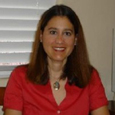 Vice Chair Vice Chair
Dana Mastro
Department of Communication
University of Arizona
Communication 317
Tucson, AZ 85721
mastro@email.arizona.edu
(520)307-0697 |
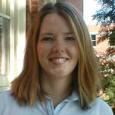 Vice Chair-Elect Vice Chair-Elect
Jennifer Stephens Aubrey
Department of Communication
University of Missouri-Columbia
203B Switzler Hall
Columbia, MO
65211
aubreyj@missouri.edu
(573) 882-0739
|
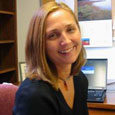 Past Chair Past Chair
Marina Krcmar
Department of Communication
Wake Forest University
PO Box 7347
Winston-Salem, NC 27109
Krcmarm@wfu.edu
(336) 758-5407 |
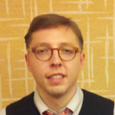 Secretary Secretary
Hugh Phillips Curnutt
Montclair State University
Communication Studies
Life Hall 225A
Montclair, NJ 07043
curnutth@mail.montclair.edu
(973) 655-4464
|
 Secretary-Elect Secretary-Elect
Andrew Weaver
Indiana University
Department of Communication
Radio-TV Center, Room 306
Bloomington, IN
47405
weaveraj@indiana.edu
(812) 856-2552
|
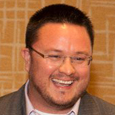 Publications & Web Editor (expires '12) Publications & Web Editor (expires '12)
Nicholas David Bowman
West Virginia University
Communication Studies
108 Armstrong Hall
Morgantown, WV 26501
Nicholas.Bowman@mail.wvu.edu
(304) 293-3905
|
 Graduate Student Rep. Graduate Student Rep.
Norma Jones
Kent State University
School of Communication Studies
135 Taylor Hall
Kent, OH 44242-0001
comm@kent.edu
(330) 672-2659 |
| Research Committee |
 Chair Chair
Srividya Ramasubramanian
Texas A&M University
Department of Communication
211 Bolton Hall
College Station, TX 77843
srivi@tamu.edu
(979) 845-5178
|
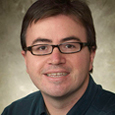 Vice-Chair Elect ('13) Vice-Chair Elect ('13)
David Rhea
Governors State University
Communication Studies
University Park, IL 60484
d-rhea@govst.edu
(708) 534-4392 |
 Vice Chair-Elect ('14) Vice Chair-Elect ('14)
Brent Malin
University of Pittsburgh
Department of Communication
1109L Cathedral of Learning
Pittsburgh, PA 15260
bmalin@pitt.edu
(412) 624-6798
|
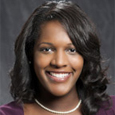 Vice-Chair Elect ('15) Vice-Chair Elect ('15)
Meagan Sanders
Louisiana State University
Manship School of Mass Communication
212 Hodges Hall
Baton Rouge, LA 70803
msand@lsu.edu
(225) 578-7380
|
| Nominations Committee |
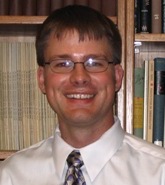 Chair (expires '12) Chair (expires '12)
Jake Jensen
University of Utah
Department of Communication
2526 LNCO
jakob.jensen@utah.edu
(801) 581-6889 |
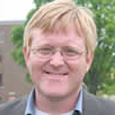 Committee (expires '12) Committee (expires '12)
Kyle Barnett
Bellarmine University
2001 Newburg Rd.
Louisville, KY 40205
kbarnett@bellarmine.edu
(502) 272-8223
|
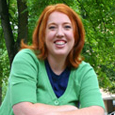 Committee (expires '12) Committee (expires '12)
Leslie Rill
Portland State University
Department of Communication
NH 34
Portland, Oregon 97207
lrill@pdx.edu
(503) 725-3608 |
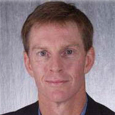 Committee (expires '13) Committee (expires '13)
Rick Busselle
Washington State University
Murrow College of Communication
214 CADD
Pullman, WA 99164-2520
busselle@wsu.edu
(509) 335-2390 |
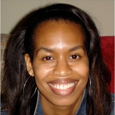 Committee (expires '13) Committee (expires '13)
Siobhan Smith
University of Louisville
Department of Communication
siobhan.smith@louisville.edu
(502) 852-6976 |
|
| Representatives to NCA General Assembly |
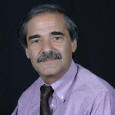 Legislative Assembly Legislative Assembly
Stan
Tickton
Norfolk State University
Mass Communication/Journalism
700 Park Ave., Unit 3249
Norfolk, Virginia 23504
stickton@nsu.edu
(757) 823-2383 |
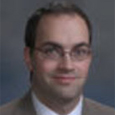 Legislative Assembly Legislative Assembly
Shane Tilton
Ohio University
Electronic Media
250 Elson Hall
Zanesville, OH 43701
(740) 453-0762 |
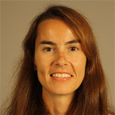 NCA Nominating Committee NCA Nominating Committee
K. Megan Hopper
Illinois State University
School of Communication
459 Fell Hall
Normal, IL 61790-4480
khopper@ilstu.edu
(309) 438-3671
|
|
|



